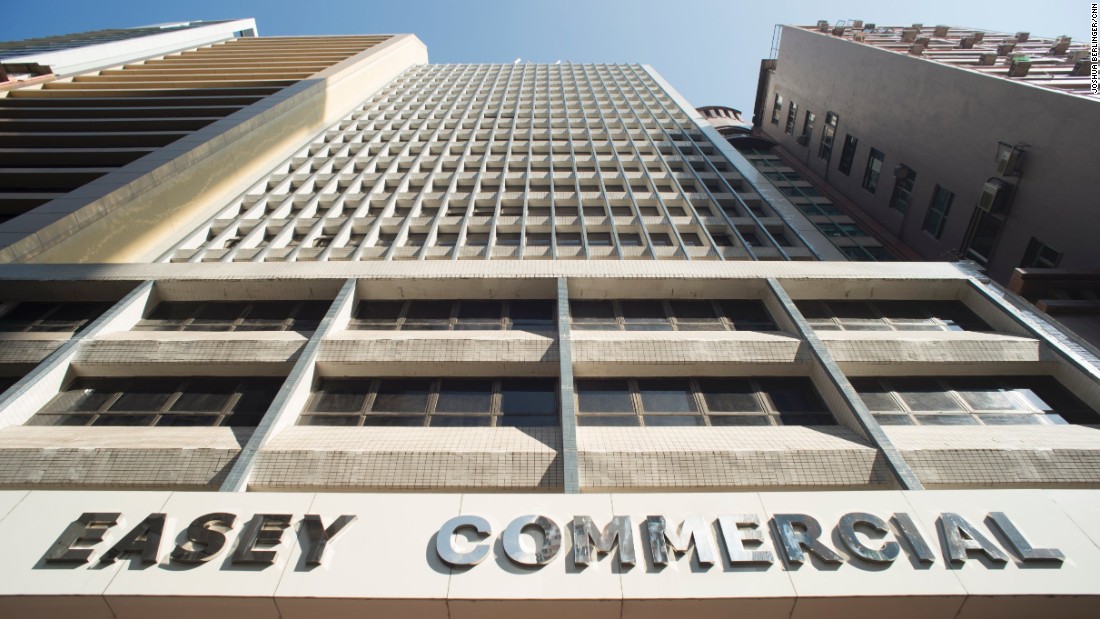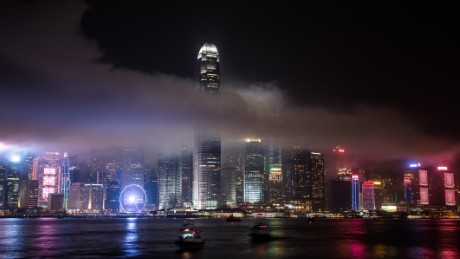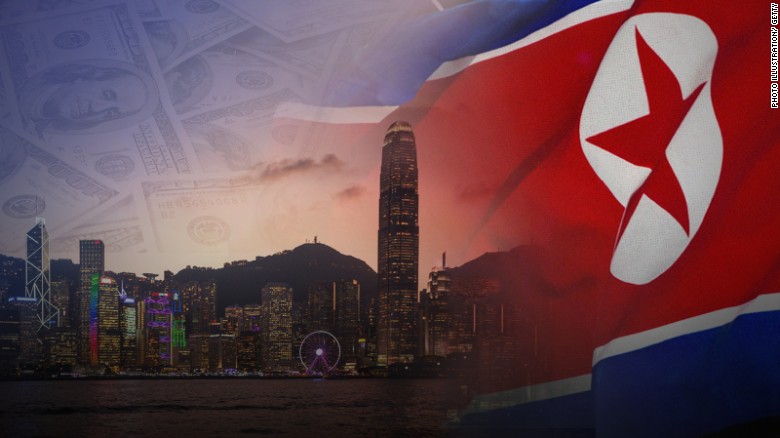Hiding in plain sight Why Hong Kong is a preferred spot for North Korea's money launderers
Hong Kong (CNN)Easey Commercial Building is an unassuming mid-rise office tower on Hennessy Road, an artery that runs through Hong Kong's busy Wan Chai district. The structure sits among scenery that's classic Hong Kong: bright lights, tall buildings, people rushing about.
But camouflaged in the normalcy is a business that seemingly exists in name only.
Take the elevator to the Easey building's 21st floor, and in room 2103 is the registered office of Unaforte Limited Hong Kong. It's a company accused by the United Nations of violating sanctions on the Democratic People's Republic of Korea (North Korea's official name) for helping the country make money internationally, funding everything from its nuclear weapons program to the lavish lifestyles of North Korean Supreme Leader Kim Jong Un and Pyongyang's most important players.
Crowds cross Hong Kong's Hennessy Road during rush hour.
At least, Unaforte is supposed to be there. That is the address listed on its publicly available corporate filings provided to the Hong Kong government. When CNN visited the office, it found neither Unaforte nor its listed company secretary, Prolive Consultants Limited.
Instead, room 2103 was home to a seemingly unrelated company: Cheerful Best Company Services. Only one man was there when CNN stopped by, and he said a representative for Prolive Consultants only comes by every so often to pick up mail. He had not heard of Unaforte.

The Easey Commercial Building in Hong Kong.
The United Nations Panel of Experts on North Korea -- the body charged with monitoring sanctions enforcement on the hermit nation -- said in two recent reports that Unaforte opened and owned a bank in the North Korean city of Rason. That is likely a violation of the latest UN Security Council resolution banning joint international ventures with North Korea, according to Christopher Wall, a lawyer who specializes in international trade law and a partner at Pillsbury Winthrop Shaw Pittman in Washington, DC.
Unaforte is not unique. It's just one of a handful of front companies identified by the United Nations, nongovernmental analysts and US law enforcement that help North Korea access the global financial system.
Why North Korea wants nukes and missiles
North Korea has long maintained it wants nuclear weapons and long-range missiles to deter the United States from attempting to overthrow the regime of Kim Jong Un.
Pyongyang looks at states such as Iraq -- where Saddam Hussein was overthrown by the United States -- and Libya -- its late leader, Moammar Gadhafi, gave up his nuclear ambitions for sanctions relief and aid, only to be toppled and killed after the United States intervened in his country's civil unrest -- and believes that only being able to threaten the US mainland with a retaliatory nuclear strike can stop American military intervention.
Many experts say they believe North Korea would not use the weapons first. Kim values his regime's survival above all else and knows the use of a nuclear weapon would start a war he could not win, analysts say.
Front companies -- also known as shell companies -- are legitimate corporations that do not possess significant assets or maintain active business operations. Some serve licit business purposes -- helping foreign companies establish a foothold in overseas markets, for one, or reap foreign tax benefits. Others help to conceal the true ownership of a business or the parties involved in illicit transactions.
RELATED: What is a front company?
Here's an example: say business A wants to sell business B something potentially unlawful, like military-grade hardware. If investigators were already monitoring business A, business B could pay a front company for the weapons instead of business A. Or business B could create its own front company to pay business A's front company, making the network even bigger and more nebulous.
North Korea is believed to use these types of practices to cover up much of its trade, from selling coal and fuel to exporting weapons.
"The (North Korean) regime accesses the international financial system through front companies and other deceptive financial practices in order to buy goods and services abroad," Sigal Mandelker, the undersecretary for terrorism and financial intelligence at the US Department of the Treasury, said in Senate testimony on September 28.
Hong Kong is one of two business jurisdictions (along with the British Virgin Islands) where the UN Panel of Experts on North Korea has seen the largest share of North Korean-controlled front companies operating, said Hugh Griffiths, the panel's coordinator.
"You can just count them up in our reports -- Hong Kong is the preponderance," Griffiths told CNN.
The city is no stranger to those looking to make a quick buck by skirting the law, whether it was the pirates who roamed the South China Sea in the 16th century or the Triads who spread their tentacles following Chinese Civil War, while the city was still under British control.
Today, Hong Kong is governed as a special administrative region of China. When the British handed control of the city to Beijing in 1997, the agreement was to run Hong Kong according to a policy known as "one country, two systems." It promised Hong Kongers their own political system -- with more individual liberties, market freedoms and lax corporate oversight and reporting requirements -- would in large part continue as is, but Hong Kong would become part of China.

Hong Kong and China: One country, two systems 01:53
"It should come as no surprise that Hong Kong is featured so prominently in our report," Griffiths said. "It's the closest major international financial center to North Korea. It's the closest major offshore international financial center to North Korea. And historically, it's been a center of global and regional trade ... and with fewer questions asked and looser regulation than, say, Beijing."
CNN reached out to both Hong Kong police and its Joint Financial Intelligence Unit for comment on the United Nations reports, Unaforte and shell companies in Hong Kong altogether and was told "police do not comment on individual case(s)."
A secretary and a director
When Unaforte's company particulars show up in Hong Kong's publicly available corporate records, the name of just one individual appears. He holds a passport from the small Caribbean island of Dominica. A passport number is there, but not a phone number.
Those details shed light on Hong Kong's incorporation requirements. To start a company in Hong Kong, one needs at least one director (has to be an actual person) and a company secretary (which can either be a person or another company, but must be based in Hong Kong), according to the Companies Registry website.
Though the company's registered office must be in Hong Kong, they are allowed to share an office with their company secretary and neither technically has to operate out of that address, an official with the Hong Kong Companies Registry told CNN on the phone. But doing that is considered a "red flag" for money laundering investigators.
"These practices, while legal, lend themselves to North Korean efforts to camouflage the real identity and nationality of those who stand behind these registered entities," said Griffiths.
C4ADS, a Washington-based nonprofit firm which conducts data-driven analysis of security issues, identified 160 North Korean front companies in Hong Kong in a 2016 report. And Sayari Analytics, another firm that uses open data to monitor the connections between firms, has identified more than 100 entities in Hong Kong linked to sanctioned North Korean ones.
The system wasn't designed for wrongdoing; rather, it makes Hong Kong an easy place for companies abroad do business, as they do not have to incur the cost of setting up a new shop, according to David Webb, a former investment banker who is now a Hong Kong-based activist investor.
"It's common and it's not a sign of wrongdoing itself," Webb said.
To service offshore clients, there are plenty of secretarial services that provide company directors abroad with assistance. They often serve as company secretaries for their clients.
News Courtesy: www.cnn.com











